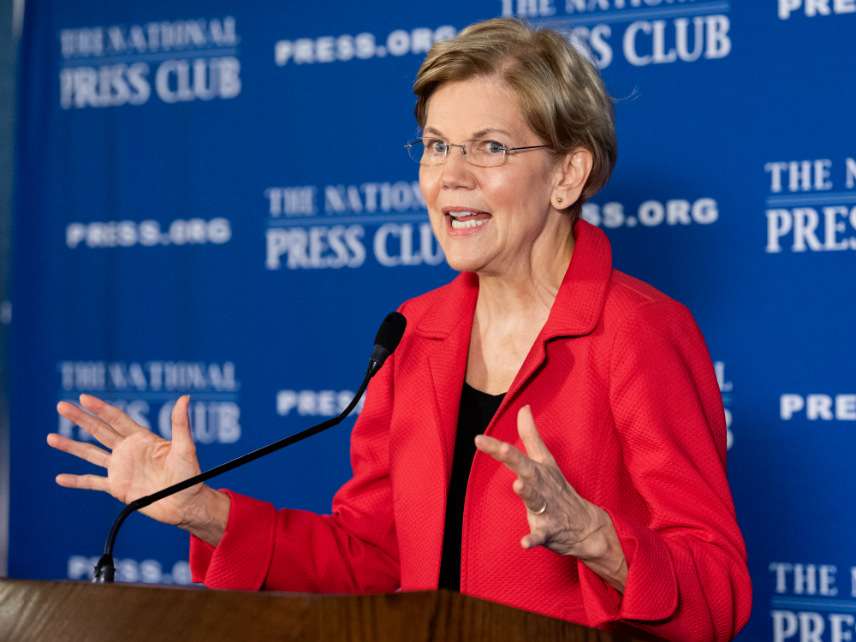Elizabeth Warren's Anti-Corruption Bill Is a Big Government Mess
In trying to squeeze corporate influence out of politics, Warren would only grow the power of the state.

Sen. Elizabeth Warren (D–Mass.) picked the best possible day to unveil a sweeping set of proposed reforms to lobbying and ethics standards.
On Tuesday morning—hours before President Donald Trump's former campaign manager Paul Manafort was found guilty of bank and tax fraud charges, and his former lawyer, Michael Cohen, pleaded guilty to tax fraud and campaign finance charges—Warren released the text of her Anti-Corruption and Public Integrity Act, which she offered as a way of truly "draining the swamp," once and for all.
"Let's face it: There's no real question that the Trump era has given us the most nakedly corrupt leadership this nation has seen in our lifetimes," the senator said in a speech at the National Press Club. "But they are not the cause of the rot—they're just the biggest, stinkiest example of it. Corruption is a form of public cancer, and Washington's got it bad."
At 289 pages, the bill is classic Warren in its approach. Like her Accountable Capitalism Act, unveiled last week, this new ball calls for a significant expansion of regulatory power, a slanting of the playing field against interest groups she dislikes, and the creation of a new independent agency to oversee the whole show.
On the regulatory front, her bill would both would "radically expand" the kinds of disclosures lobbyists would have to make, as well as who would have to register as a lobbyist in the first place.
Currently, anyone who is paid more than $3,000 by a single client to make more than one contact with a covered official—say a Congressman or one of his or her staff—for the purposes of influencing policy, and also spends more than 20 percent of their time on "lobbying activities"—all the research and preparation that might go into contacting that covered official—has to register as a lobbyist.
Warren's bill would change the requirement for registering as a lobbyist to include anyone who engages in these "lobbying activities."
Once a person is registered, every single phone call, email, or meeting a registered lobbyist has or exchanges with a covered official would have to be documented and disclosed, including a description of what the contact was about, as well as the names of anyone who might have helped set up the contact or did other "lobbying activity," which could mean something as simple as research or preparation.
Given just how many people could be classified as lobbyists under the above definitions, Warren's bill amounts to a substantial regulatory burden on one's constitutional right to petition the government. It also drastically increases the likelihood that otherwise law-abiding people will violate federal law without intending to.
As is the case with most regulations, Warren's legislation would not overly burden the power players (who can afford to comply) or shady dealers (who will quickly sniff out the loopholes). Instead, it's going to be less moneyed groups and individual citizens most likely to accidentally run afoul of the law, or flat-out refrain from expressing their policy preferences to legislators. This legislation could have a subzero chilling effect on nonprofit advocacy, for example.
Warren's bill would also create a whole new category of "corporate lobbyist"—defined as a lobbyist working for a for-profit company or a trade association—that would come with special restrictions and regulations. The bill would forbid these corporate lobbyists from taking government jobs for six years after stopping their lobbying activities. Non-corporate lobbyists, meanwhile, would only have to wait two years before taking government jobs.
Former federal officials would likewise have to wait six years until being allowed to take up corporate lobbying jobs. Those transitioning to non-corporate lobbying jobs would only have to wait two years.
This kind of complexity will breed some very weird legal innovations that will serve to further obscure the relationships between legislators, bureaucrats, and people outside of government advocating for and against regulations and legislation.
More sweeping still would be legal reforms in Warren's bill—justified as a means of preventing "corporate capture"—that would allow people to sue regulatory agencies for supposed failures to enshrine or enforce regulations, as well as requiring courts to presumptively defer to agency interpretations of laws. Warren would also tax lobbying expenditures to help fund federal regulatory activities.
To top it all off, Warren would create a new U.S. Office of Public Integrity that would operate as an independent agency insulated from congressional or executive oversight. Similar in form to the Consumer Finance Protection Bureau, this new agency would be tasked with enforcing the myriad new rules, requirements, and regulations in her bill.
It's not all bad, however. Warren's bill includes some sensible reforms, such as a prohibition on elected officials and senior appointees from owning individuals stocks, and a requirement that the president and vice president sell off their assests or otherwise place them in a blind trust (something our current president has so far refused to do.)
Nevertheless, Warren's vision is one of a government that heavily regulates business activity while at the same time strictly limiting the ability of businesses to have a say in the very regulations that affect them. The expectation that firms should just passively accept rules written for them is markedly authoritarian.
So long as the federal government insists on regulating the most minute aspects of private economic activity, businesses will have a legitimate reason to influence those regulations, often in ways that benefit them at the expense of their competitors.
The root of the problem, in other words, is D.C.'s insistence on meddling in the market beyond what is necessary to protect consumers from fraud, theft, and monopoly. Warren's proposed solution will not lead to squeaky clean government of, for, and by the people, but more government power, and consequently, more nuanced and sophisticated efforts by big business to influence how that power is used.
